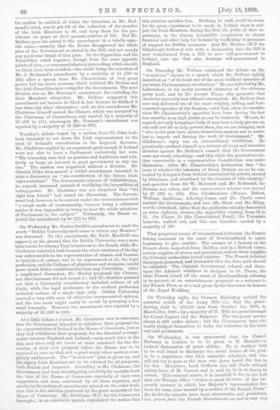At a little before 5 o'clock, Mr. Gladstone rose to
announce that the Government intended to withdraw their proposal for the representation of Ireland in the House of Commons, just as they had withdrawn their proposals for the financial arrange- ments between England and Ireland,—only much later in the day, and when only six hours at most remained for the dis- cussion of their new proposal before the House was to be required to vote on that and a good many other matters com- pletely undiscussed. The "in-and-out " plan is given up, and the eighty Irish Members are to be retained for all purposes, both British and Imperial. According to Mr. Gladstone, the Government had been investigating carefully for months back the bias of the House of Commons, especially of their own supporters, and were convinced by all these inquiries, and chiefly by the notices of amendments placed on the order book, that this is the solution preferred by the great majority of the House of Commons. Mr. Rathbone (M.P. for the Carnarvon boroughs), in an admirable speech, repudiated the notion that this solution satisfies him. Nothing, he said, could be worse for the great experiment to be made in Ireland than to sub- ject the Irish Members, during the first six years of that ex- periment, to the almost irresistible temptation to obtain financial and other help for Ireland by trafficking in promises of support for British measures. And Mr. Wallace (M.P. for Edinburgh) followed suit with a declaration that the Bill is now transformed from a Bill to give self-government to Ireland, into one that also destroys self-government in England.


































 Previous page
Previous page